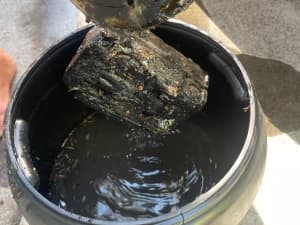Fire and Rescue NSW recording Lithium-Ion battery fires at a rate of five a week - NSW
Published: 15 Mar 2024 11:48am
Fire and Rescue NSW (FRNSW) has expressed concerns about the rising rate of Lithium-Ion battery fires as crews responded to four separate incidents yesterday.
Nine fire trucks rushed to an address in Apprentice Drive at Berkeley, on the state’s Central Coast, just after 5pm yesterday when an electric vehicle charging station caught alight.
Crews established a defensive perimeter around the business, fearing multiple Lithium-Ion truck batteries were at risk of catching fire.
Firefighters extinguished the blaze without further incident.
Around 4pm yesterday, a tradesman drove to the Tingira Heights Fire Station at Lake Macquarie, alerting firefighters that his toolbox was on fire.
The maintenance worker told the crew he was driving when he noticed a large amount of smoke in his rear vision mirror.
When he stopped his ute and opened the large toolbox, he found an unattached battery for his hedger ablaze.
The man covered the flames in dirt and drove to the nearby fire station.
Firefighters opened the toolbox and observed the dirt bubbling as the battery had entered a process, known as ‘Thermal Runaway; whereby the cell was off-gassing and threatening to explode.
They submerged the battery in a container of water until the danger had passed.
In a third incident around 12.45pm yesterday, a fire broke out in the rear of a garbage truck travelling along Derby Street at Silverwater, in Sydney’s west.
The driver stopped the truck and tipped the burning rubbish onto the roadway.
FRNSW crews arrived and found one battery amongst around 150 Lithium-Ion cells had entered ‘Thermal Runaway’ and was on fire.
The battery was submerged in water, preventing a chain reaction, and the scene cleaned up.
In a fourth Lithium-Ion battery-related blaze, an e-bike caught fire on the third floor of a 10-storey apartment block at Bankstown, in Sydney’s south-west.
Residents were evacuated from the French Avenue address around 6.30am, as 25 firefighters and four trucks responded to the scene.
Sprinklers were activated and suppressed the flames.
The fire crews extinguished the fire and ventilated the building.
An occupant suffered a superficial burn when he tried to remove the burning e-bike.
FRNSW has recorded 63 Lithium-Ion battery fires to date in 2024, subject to review, at a rate of 5.7 blazes a week.
Seven people have been injured in the fires.
There were 272 Lithium-Ion battery-related fires in 2023, at a rate of 5.2 a week.
Thirty eight people were injured last year.
FRNSW is reinforcing its public messages to households and businesses to use extra caution around Lithium-Ion batteries and related devices.
It warns people:
- Never sleep or leave home with your Lithium-battery-powered devices charging
- Don’t leave them constantly on charge
- If Lithium batteries are damaged or compromised, dispose of them properly
- Don’t throw them out in the rubbish, they can start garbage truck or rubbish tip fires when compacted
- Contact your local, approved recycling centre for disposal advice
- Don’t leave devices charging on beds, sofas or around highly flammable materials
- Try to charge devices outside if possible
- Always buy reputable Lithium-battery brands and never ‘mix and match’ components
- Beware of cheap, substandard Lithium battery-powered devices
- Avoid dropping, crushing or piercing battery cells
- Store batteries and devices in a cool, dry area, away from combustible materials
- Install active smoke alarms in your home/garage
- Ensure you have a home evacuation plan in the event of fire
- Don’t store or charge Lithium-Ion-powered devices near exit points in your home or business.
For further information, visit the FRNSW website: https://www.fire.nsw.gov.au/page.php?id=9389 [external link]
Updated: 22 Mar 2024 12:07pm
Related safety topics
It's important that we all understand the risks of lithium-ion batteries and be prepared if things go wrong.
It“s the law to have at least one working smoke alarm installed on every level of your home.
Having a home escape plan and a working smoke alarm increases your chances of getting out safely.
Details about this incident may change and should not be used as emergency information and/or advice.
For all life threatening emergencies, call Triple Zero (000)
For flood information, warnings or requests for non-life threatening assistance, call the SES on 132 500 or visit the NSW State Emergency Service website here. [external link].
For information directly relating to bushfires please call the Bush Fire Information Line on 1800 679 737 or visit the NSW Rural Fire Service Website here. [external link]




